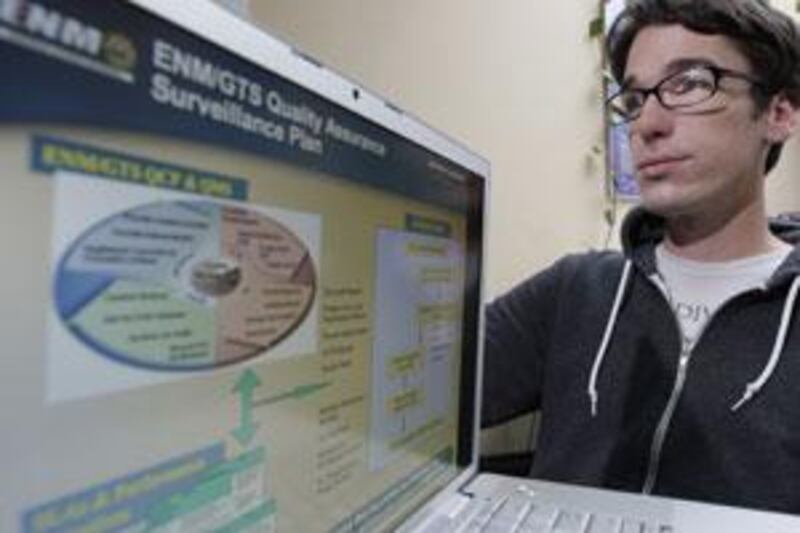VANCOUVER // When a group of Canadian journalism students travelled to Ghana to investigate an electronic waste dump, they knew they were on to a good story. But they never dreamed they would uncover sensitive information about contracts between the US Department of Homeland Security, the Pentagon and Northrop Grumman, a global security company. The students purchased five hard drives for C$40 (Dh127.1) each. The first four contained personal data and family photographs from people in Britain and New Zealand. But when they checked the fifth, United States government documents appeared.
"It was incredibly exciting when we realised what we had," said Blake Sifton, who graduated in May. "We were hoping to find something good, but we never expected this." The hard drive, which had been scrapped by Northrop Grumman, contained information on multimillion dollar security contracts. Documents included details about recruitment for the US federal air marshal programme, which places undercover officers on airline flights to apprehend terrorists.
The students took their findings to officers at the US Federal Bureau of Investigation. "They expressed definite concern," said Mr Sifton. "If an organisation wanted to infiltrate air security, this would teach them what the hiring process is like and help them get a person in." The global trade in electronic waste presents risks for individuals too. The US state department lists Ghana as one of the world's top sources of cyber crime. Off camera, locals told the students that criminals often buy hard drives from open-air markets to scour for personal data such as credit card and bank account numbers.
Led by Peter Klein, their professor at the University of British Columbia, the graduate students made a documentary that follows the path of electronic waste, such as old computers, from North America to toxic dumping grounds in China, Ghana and India. Prof Klein, a former producer with CBS's 60 Minutes, said these kinds of stories were becoming increasingly harder to tell as news organisations facing budget cuts were loath to spend money on investigative projects, especially in far-flung corners of the world.
When news organisations are squeezed financially, foreign reporting is usually the first to suffer. A survey released July 2008 by the Pew Research Center found that two thirds of US newsroom executives said their newspapers had cut the amount of space devoted to international news during the previous three years. Nearly half said they had reduced resources for foreign reporting. Some hail the rise of citizen journalism, but Mr Klein said bloggers and others using digital tools such as Twitter cannot replace traditional journalists. For example, he said, while Twitter has played a key role in informing the world about recent upheaval in Iran, where the government has imposed a media blackout, much of that information is impossible to verify.
But the decline of foreign reporting started long before the digital revolution, said Mr Klein. After the fall of the Soviet Union, many news organisations began shutting down bureaus in places such as Africa and the Middle East. "With the Cold War narrative gone, it became much more difficult to cover these stories," he said. Many in the US felt that some countries didn't "matter" anymore since they were no longer pawns in an ideological struggle. And Americans could no longer see a direct connection between themselves and people in those countries, he explained.
But stories such as the one his students produced prove that countries like Ghana do matter, said Mr Klein. "This is our old computers causing harm in the developing world. Maybe I'm idealistic, but I think most North Americans care about their impact on the world." At a dump site near Ghana's capital, Accra, Mr Sifton said he and his fellow students found a "charred toxic wasteland" where boys and young men melted down old computer parts to extract copper to sell for less than 50 cents a kilogram. Sharp shards of plastic and metal jutted up from the ground and the air was thick with acrid smoke. Upon returning to his hotel he had to scrub for 20 minutes to remove chemical residue from his skin.
While PBS broadcast the documentary on Frontline, it was paid for by a grant from Alison Lawton, a Vancouver philanthropist who heads the Mindset Foundation. She donated $1 million to the journalism school to fund an international reporting course. "My best hope is that this programme will inspire these young journalists to continue covering under-represented issues regardless of support from traditional media outlets and conglomerates," said Ms Lawton at the April 7 launch for the course.
Mr Klein said foundations such as Ms Lawton's would probably play a larger role in the future of journalism. In addition, news organisations were likely to rely more on freelancers for foreign reporting rather than maintaining costly bureaus. That comes as good news to Mr Sifton who said he went to journalism school with the intention of reporting internationally. While correspondent jobs are in short supply, he said he was "optimistic" that he could build a successful freelance career, possibly supported by the occasional grant.
Regardless of the business model, the job remains the same according to Mr Klein: "We have a real responsibility to be the eyes and ears of the public. People will go to Paris or London; most won't go to the slums of Accra. We are there as witnesses." jferrie@thenational.ae






